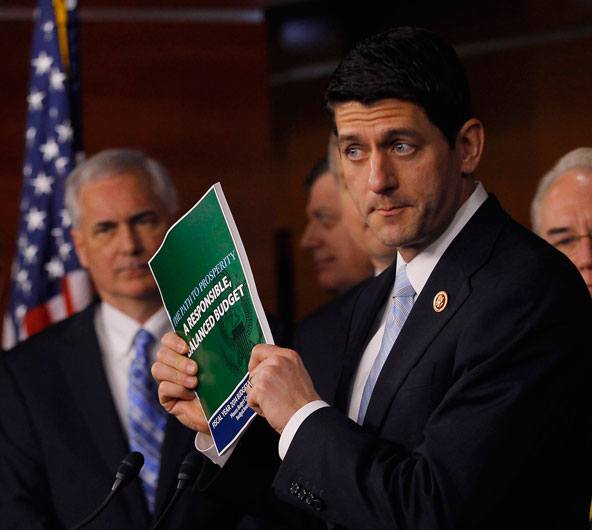
WASHINGTON (CNS) — On Capitol Hill, when it’s spring it’s time to debate the federal budget.
Republicans and Democrats set spending parameters for fiscal year 2014 by adopting two starkly different budget plans before recessing a week before Easter. What’s expected when Congress returns April 8 is a lengthy debate over whether austerity and lower taxes or modest adjustments in government spending supplemented with selected tax law changes to boost revenues is the way to go.
The debate will come as the impact of the March 1 automatic spending cuts in hundreds of government-funded programs — known as the sequester — begins to pinch social service providers.
“The longer this has gone on, the more concerned our agencies are becoming,” Candy Hill, senior vice president for social policy and government affairs at Catholic Charities USA, told Catholic News Service March 27.
That’s because local agencies are unsure how large the funding losses will be, Hill said. While the sequester set cuts at 5.2 percent, the fact that the cuts are coming midway through the fiscal year means the funding losses will be more severe — in some cases double digits, she said.
Hill provided a partial list of diocesan Catholic Charities programs that will be squeezed: refugee assistance, Head Start, homeless services and education and the Social Services Block Grant that funds feeding, child abuse prevention and substance abuse programs. Cuts in the Special Supplemental Nutrition Program for Women, Infants and Children likely will mean more families showing up at hunger centers, she added.
Overall, programs serving youth, families, the elderly, people with disabilities and migrant workers will see $29.9 billion in cuts by Sept. 30, the end of the fiscal year, reports the National Human Services Assembly, whose membership includes Catholic Charities USA.
Most Republicans would like to see even lower spending combined with reduced tax rates. A spending plan reflecting those priorities for fiscal year 2014 was drafted by Rep. Paul Ryan, R-Wis., House Budget Committee chairman. It passed 221-207 March 21.
Ryan advocated that his plan carried out for the next decade would lead to a balanced budget in 2023 as spending on non-military programs would decline, Medicaid and Medicare would be remade and the Affordable Care Act would be repealed. The plan also calls for simplifying the tax code with a 10 percent rate for lower income earners and a 25 percent rate for higher income earners and corporations.
An anaylsis by the Washington-based Tax Policy Center projected that the plan would reduce government revenues by more than $5.7 trillion over the next decade, leading to drastic cuts in domestic spending.
Ryan spokesman Kevin Seifert said the congressman was unavailable to comment on the analysis.
In the Senate, where Democrats hold the majority, a more moderate budget was approved, 50-49, early March 23. It calls for slight adjustments in spending and raising revenues by closing loopholes and altering deductions for high income Americans as the way to stabilize the country’s growing debt.
Sen. Patty Murray, D-Wash., Senate Budget Committee chairwoman, has said the spending plan reflects a balanced approach to solving the country’s budget concerns. In introducing the proposal, Murray said the budget “tackles the deficit and debt the way the American people wanted it done.”
As the congressional votes neared, advocates for the poor raised their voices in an attempt to minimize budget cuts on programs benefiting people whose voices go largely unheard on Capitol Hill. A diverse pool that included Catholic Charities, the U.S. Conference of Catholic Bishops and Network, the Catholic social justice lobby, blanketed Congress with their concerns that the budget must reflect society’s moral obligation to care for “the least of these.”
Among the most persistent voices have been the chairmen of two USCCB committees.
Bishop Stephen E. Blaire of Stockton, Calif., chairman of the Committee on Domestic Justice and Human Development, and Bishop Richard E. Pates of Des Moines, Iowa, chairman of the Committee on International Justice and Peace, cited Catholic social teaching in reiterating their concern in a March 18 letter to all members of Congress that government programs serving poor and marginalized people deserve the highest priority.
“While we lack the competence to offer a detailed critique of entire budget proposals, we do ask you to consider the human and moral dimensions of these choices,” they wrote.
Matthew Hale, associate professor of political science and public affairs at Seton Hall University in South Orange, N.J., while remaining neutral, explained that in today’s polarized political climate, there is little reason for members of Congress to budge from their staked out positions.
For Hale, Catholic social teaching and its emphasis on human dignity illustrates the balance that policymakers can work to reach.
Those concerns were discussed at a small ecumenical gathering of advocates for the poor in the Upper Senate Park near the Capitol March 20. Sponsored by Faith in Public Life, a faith-based advocacy group, the gathering focused on the miracle of the loaves and fishes.
Addressing about 20 people, Sister Simone Campbell, a Sister of Social Service and executive director of Network, challenged the idea that austerity was the right path for the country.
She compared the daily struggles of needy Americans and the debate about the country’s future fiscal path with the miracle of the loaves and fishes witnessed by the throng gathered in Galilee to hear Jesus speak. In the end, she recalled, everyone was fed.
“It was the men who felt it was a miracle. The women knew what it was. They brought the food and they were willing to share,” Sister Simone said.
The miracle can serve as an example for people today, she told Catholic News Service.
“We know as Catholics that there is enough to go around if we share,” she explained. “Jesus Christ in Scripture says, ‘Feed the hungry.’ We’re saying there is enough to go around.”
— By Dennis Sadowski Catholic News Service






